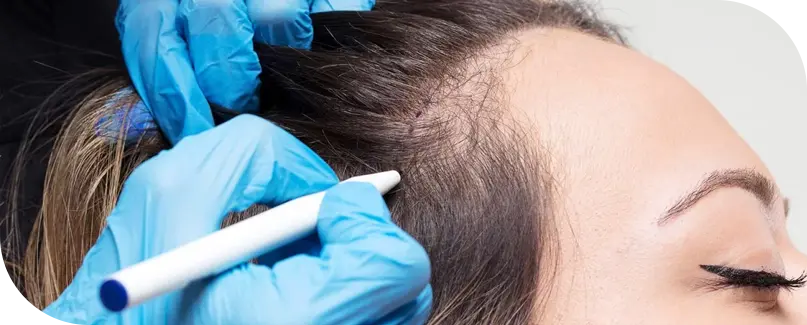Hair Transplant For Women In Turkey
Hair loss can be an intensely personal struggle for women, often affecting self-esteem and confidence. At ClinMedica, we recognize the emotional toll this issue can take. We specialize in Women Hair Transplant in Turkey, a country at the forefront of hair loss treatments for women. Our advanced procedures are designed to deliver natural, transformative results, helping women regain their confidence and restore their hair.
Why Turkey is a Global Leader in Hair Restoration for women
Turkey isn’t just a popular holiday destination; it’s a global hub for hair restoration, especially for women. This rise is due to several key factors:
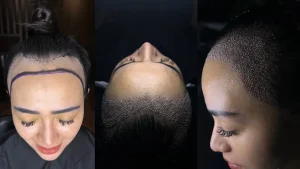
- Expertise That Understands Women: Turkish surgeons aren’t just skilled; many specialize in female hair loss patterns, understanding the unique concerns women have, from maintaining their hairstyle during the procedure to achieving natural-looking results that complement their feminine features.
- Techniques at the Forefront: Turkey embraces innovation. While the FUE (Follicular Unit Extraction) method is widespread, it’s the DHI (Direct Hair Implantation) and Sapphire Pen techniques that are revolutionizing hair transplants for women.
- DHI for Preserving Your Style: One of the most appealing aspects of the DHI technique for women is that it often eliminates the need to shave the area experiencing hair loss. This means you can maintain your hairstyle and privacy throughout the recovery process. Only a small area in the donor region needs to be trimmed, which is easily concealed by your existing hair.
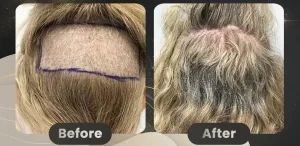
- Affordability That Empowers: In addition, the cost of living in Turkey, combined with a thriving medical tourism industry, means high-quality hair transplants are accessible to a wider range of women. This isn’t about cutting corners; it’s about making transformative procedures affordable without compromising on expertise or care.
- Holistic Experience, Not Just Surgery: Furthermore, many clinics in Turkey understand that a hair transplant is more than a medical intervention. It’s a personal journey. They offer comprehensive packages, from airport pick-up to post-operative support, ensuring women feel cared for and comfortable throughout their stay.
Is it Possible for Women to Have Hair Transplant Without Shaving?
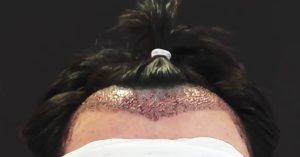
This is a question we constantly receive from women who want a hair transplant but are afraid to shave the entire head. Therefore, we will explain to you when to shave the entire head and when to shave only a small area of the donor area:
Often people think that the DHI hair transplantation technique is the most appropriate technique if we do not want to shave our hair, but let me explain to you some details:
Perhaps you will be surprised that I will tell you now that it is also possible to transplant hair without shaving, whether with the DHI technique or the sapphire pen technique.
DHI vs. Sapphire FUE for Women Hair Transplant
Both DHI and Sapphire FUE offer advantages for Women Hair Transplant, with some key differences:
Understanding Hair Loss in Women
Hair loss in women is a common concern, often presenting as a gradual thinning of hair or a receding hairline. While some women notice immediate changes, others may experience a more subtle, diffuse pattern of hair loss that’s harder to detect. Various factors can contribute to this, including:
- Genetics: Female pattern hair loss (androgenetic alopecia) is the most common cause, often inherited from family members.
- Hormonal Imbalances: Similarly, fluctuations in hormones, such as during menopause or postpartum, can trigger hair loss.
- Hair Care Practices: Harsh chemicals in hair dyes and styling products can damage hair and lead to breakage or loss.
- Stress: Furthermore, high levels of stress can disrupt the hair growth cycle, leading to increased shedding.
Important Considerations Before Women Hair Restoration

While most healthy women are suitable candidates for Hair Restoration, certain factors warrant special consideration:
- Medical Conditions: Women with cardiovascular disease, uncontrolled diabetes, or autoimmune disorders should consult with their doctor before undergoing a Hair Restoration for women.
- Donor Area: A healthy donor area with sufficient hair follicles is essential for a successful transplant.
- Realistic Expectations: It’s crucial to have realistic expectations about the results and recovery process. Hair transplants are not an instant fix, and it takes time for the transplanted hair to grow and reach its full potential.
Postpartum Hair Loss

Intensive hair thinning after childbirth is a common experience due to hormonal fluctuations. This is usually a temporary condition, with hair typically regrowing within a few months to a year. However, factors like stress, nutritional deficiencies (such as iron deficiency), and scalp health can influence the recovery process. Maintaining a healthy lifestyle, managing stress, and using gentle hair care products can aid in recovery.
Who is a Good Candidate for a Women Hair Transplant surgery?
women Hair transplant surgery may be a good option for you if you:
- Are experiencing hair loss due to genetics, hormonal changes, or medical conditions.
- Have realistic expectations about the results and the recovery process.
- Are in good overall health and do not have any medical conditions that could interfere with the surgery or healing.
- Have a sufficient amount of donor hair available.
The choice between DHI and Sapphire pen depends on your individual preferences, hair characteristics, and desired outcome. Our expert surgeons will guide you through the decision-making process, ensuring you choose the technique that best suits your needs.
(The rest of the article covering the DHI technique, understanding hair loss in women, important considerations, post-partum hair loss treatment for women, planning your hair transplant in Turkey, and a final word of encouragement remains the same.)
Afro Hair Transplant For Women

We recognize that women with Afro hair transplant for women may have specific concerns about hair transplants. Rest assured, Sapphire FUE technique are highly effective for Afro hair transplant for women. Our experienced surgeons are skilled in handling the unique characteristics of this hair type, ensuring that the transplanted hair blends seamlessly with your natural hair for a beautiful, natural-looking result. We take extra care to preserve the curl pattern and density of your hair, resulting in a fuller, more vibrant look that celebrates your unique beauty.
Hair loss can be a challenging experience, but it doesn’t have to define you. With advanced techniques like DHI and Sapphire FUE, experienced surgeons, and a supportive environment, Turkey offers a transformative solution for women seeking to reclaim their confidence and restore their natural beauty.
At ClinMedica, we understand the unique needs of women experiencing hair loss treatment for women in Turkey.
. We are committed to providing personalized care, state-of-the-art techniques, and a safe, comfortable experience throughout your hair restoration journey. Remember, you are not alone, and a fuller, more vibrant you is within reach.
See the afro hair transplant for women results here
Causes of a Receding Hairline in Women
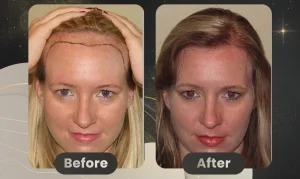
A receding hairline in women is a multifaceted issue with numerous underlying causes. Understanding these factors is crucial for identifying effective treatments and preventive measures. Here are some of the primary causes of a receding hairline in women:
1. Genetics
Genetic predisposition plays a significant role in hair loss. Female pattern baldness, also known as androgenetic alopecia, is a common hereditary condition that can lead to a receding hairline. If your family has a history of hair loss, you are more likely to experience similar issues.
2. Hormonal Changes
Hormonal fluctuations, particularly those related to pregnancy, childbirth, menopause, and thyroid conditions, can significantly impact hair growth. During menopause, for example, decreased estrogen levels and increased androgen levels can lead to thinning hair and a receding hairline.
3. Stress and Illness
Both physical and emotional stress can trigger a condition called telogen effluvium, where hair follicles enter the resting phase prematurely, leading to increased hair shedding. Chronic illnesses and treatments such as chemotherapy can also cause significant hair loss treatment for women.
4. Nutritional Deficiencies
A lack of essential nutrients, such as iron, vitamin D, biotin, and protein, can weaken hair and contribute to hair loss. A balanced diet rich in these vitamins and minerals is vital for maintaining healthy hair growth.
5. Hairstyles and Hair Treatments
Regular use of tight hairstyles like ponytails, braids, and buns can cause traction alopecia, a type of hair loss treatment for women.
caused by pulling on the hair shafts. Chemical treatments, including coloring, perming, and straightening, can also damage hair follicles and lead to thinning.
6. Medical Conditions
Certain medical conditions, such as polycystic ovary syndrome (PCOS), lupus, and alopecia areata, can lead to hair loss and a receding hairline. These conditions often require specialized treatments to manage symptoms and mitigate hair loss treatment for women.
7. Aging
As women age, natural hormonal changes and decreased cellular regeneration can lead to thinning hair and a receding hairline. Aging affects the overall health of hair follicles, making them less efficient in producing healthy hair.
8. Environmental Factors
Exposure to environmental pollutants, harsh weather conditions, and UV radiation can damage hair and scalp health, leading to increased hair loss. Protecting hair from these environmental factors is essential for maintaining its integrity.
Planning for women Hair Transplant in Turkey
A women hair transplant in Turkey typically requires a short stay of three days: one for the procedure, one for rest, and one for a follow-up wash.
At ClinMedica, we understand the importance of dedicating ample time and attention to each patient. To ensure the highest quality of care and results, our surgeon performs only one operation per day. This allows for a truly personalized experience, with the surgeon’s full focus on your individual needs and goals.
The ClinMedica Difference – Personalized Care and Advanced Techniques
At ClinMedica, we elevate our commitment to Hair loss treatment for women through:
- One Patient, One Focus: Our surgeon performs only one operation per day. This allows him to dedicate his full attention and expertise to each individual, ensuring a personalized approach and meticulous attention to detail.
- Hygiene as a Priority: We prioritize your safety and well-being. Tools like our Choi pens (for DHI) and Sapphire blades (for FUE) are used only once, adhering to the strictest hygiene standards.
- Tailored Techniques: We specialize in both DHI and Sapphire FUE, allowing us to recommend the best approach for each woman’s unique hair characteristics and goals. We understand that many women prefer to avoid shaving their head, and our expertise in DHI makes this a viable option.
What to Expect After Women Hair Transplant
Like any surgical procedure, Women hair transplants can have temporary side effects, including:
- Edema (Swelling): This may occur in the donor area and the recipient area.
- Itching: Your doctor may prescribe antihistamines to manage any itching.
- Shock Loss: Some transplanted hairs may shed initially, but this is a normal part of the process. The hair follicles remain intact and will produce new, permanent hair.
Explore Women Hair Transplant before after

